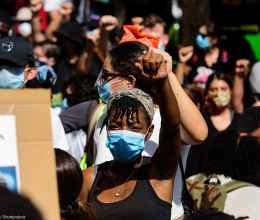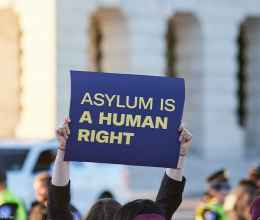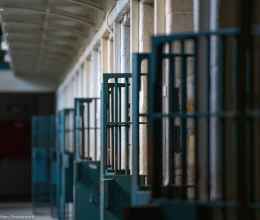
In the middle of a pandemic, more than 11 million Floridians exercised their fundamental right to vote. That’s 77 percent of the 14.4 million registered voters in our state. Thank you for being a voter and fighting for civil liberties all year long.
In Florida, despite losses, millions of voters embraced criminal justice reform, police accountability and immigrants’ rights.
Voters delivered key civil liberties wins that we can build momentum on. Voters defeated proposed constitutional amendment #3, which would have mandated that all candidates for governor, state cabinet and legislative offices, regardless of party, run in the same primary. The top two finishers would face off in the general election, meaning that two members of the same party could end up running against each other, preventing voters from being able to vote for a member of their own party in the final contest.
This measure would have also made it harder for candidates of color and third-party candidates to win elections. At a time when Floridians need greater racial, ethnic, religious, and gender diversity in their elected officials, this measure would have silenced voters of color and potentially hinder those prospects.
For those reasons, the ACLU opposed the measure and Florida voters agreed.
Also defeated in 2020 was proposed constitutional amendment #4, which would have forced all future amendments to the Florida Constitution to be approved by 60 percent in two elections, not just one, as is currently the law.
This amendment was a cynical political effort to obstruct voters’ ability to pass future constitutional amendments, even those with support from a supermajority of voters.
Currently, Floridians have the power to directly enact reforms when elected officials fail to act on the will of the people. In recent years, such changes have included minimum wage, water and land conservation, limits on political gerrymandering, legalization of medical marijuana, and restoration of voting rights for returning Floridians.
Proposed constitutional amendment #4 was a blatant attempt to block the will of Florida citizens and solidify power in wealthy special interest groups and the politicians that they lobby.
Again, the ACLU opposed it and voters agreed.
The ACLU of Florida is non-partisan and does not support, oppose or endorse candidates. During this election cycle, we launched an unprecedented campaign, ACLU Justice Voter, to educate voters about the power that state attorneys, sheriffs, supervisors of elections and mayors have on the direction of civil liberties in our communities. We focused specifically on Broward, Orange, Osceola and Miami-Dade counties and stressed the issues of holding police accountable, ending the practice of sending kids to adult jail, ending cash bail, protecting immigrant communities, and increasing voter access to the ballot box.
At the polls, voters in those counties took those issues to the ballot box and embraced these reforms by electing a Mayor in Miami-Dade whose platform focused on supporting immigrant communities and by electing several new state attorneys with a demonstrated commitment to reforming our criminal legal system and ensuring that it functions the same for Black and brown communities, as it does for white communities.These actions prove that Florida voters do want to advance true justice and equity in our communities. This voter education effort is only the beginning of our work educating voters on critical civil liberties issues and why our vote is so powerful.
The ACLU of Florida also continued to fight to advance voting rights for returning citizens, despite the Governor signing into law Senate Bill 7066, which required that returning citizens must first pay all of their legal financial obligations prior to registering to vote, which amounts to a poll tax. Passage of that law eliminated the right to vote for hundreds of thousands of citizens and has led the ACLU and our partners to take to the courts for its repeal.
Despite that roadblock, the ACLU worked to identify Floridians who still qualified to vote under SB7066 and to empower them to engage in the 2020 election. The battle to win those voting rights will continue.
For four years, with over 400 legal actions filed, the ACLU has courageously led the fight against the Trump Administration's cruel disregard for people and their families, human rights, and the Constitution. In Florida, we have a lot of work to do to repair the harm done to our communities over the last four years.
We must not only build a better Florida, we have to reimagine a more just and fair Florida that centers racial justice and builds true power in our communities. Post-election, we must remain more vigilant than ever and fight attacks in our state to erode our democracy.
We can build on the civil liberties wins we saw at the ballot box in November. That work starts with all of us, now. Together, we will transform Florida because “We the People” means all of us.



